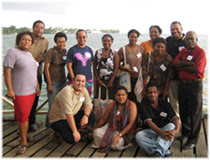From The Associated Press
December 4, 2007 Tuesday 4:56 AM GMT
Fleeing rising seas, Pacific villagers seek help at Bali climate conference
By CHARLES J. HANLEY, AP Special Correspondent
KILU Papua New Guinea
Squealing pigs lit out for the bush and Filomena Taroa herded the grandkids to higher ground last week when the sea rolled in deeper than anyone had ever seen. What was happening? "I don't know," the sturdy, barefoot grandmother told a visitor. "I'd never experienced it before."
As scientists warn of rising seas from global warming, more and more reports are coming in from villages like this one on Papua New Guinea's New Britain island of flooding from unprecedented high tides. It's happening not only to low-lying atolls, but to shorelines from Alaska to India.
This week, by boat, bus and jetliner, a handful of villagers are converging on Bali, Indonesia, to seek help from the more than 180 nations gathered at the U.N. climate conference. The coastal dwellers' plight once theoretical appears all too real in 2007, and is spreading and worsening.
Scientists project that seas expanding from warmth and from the runoff of melting land ice may displace millions of coastal inhabitants worldwide in this century if heat-trapping industrial emissions are not sharply curtailed.
A Europe-based research group, the Global Governance Project, will propose at the two-week Bali meeting that an international fund be established to resettle "climate refugees."
Summarizing the islanders' plight, Ursula Rakova said: "We don't have vehicles, an airport. We're merely victims of what is happening with the industrialized nations emitting `greenhouse gases.'"
The sands of Rakova's islands, the Carteret atoll northeast of Bougainville island, have been giving way to the sea for 20 years. The saltwater has ruined their taro gardens, a food staple, and has contaminated their wells and flooded homesteads. The remote islands now suffer from chronic hunger.
The national government has appropriated $800,000 to resettle a few Carteret families on Bougainville, out of 3,000 islanders.
"That's not enough," Rakova told The Associated Press in Papua New Guinea's capital, Port Moresby. "The islands are getting smaller. Basically, everybody will have to leave."
In a landmark series of reports this year, the U.N. climate-science network reported seas rose by a global average of about 0.12 inches annually from 1993 to 2003, as compared with about 0.08 inches annually for the period 1961-2003.
But a 2006 study by Australian oceanographers found the rise was much higher, almost one inch every year, in parts of the western Pacific and Indian oceans.
"It turns out the ocean sloshes around," said the University of Tasmania's Nathaniel Bindoff, a lead author on oceans in the U.N. reports. "It's moving, and so on a regional basis the ocean's movement is causing sea-level variations ups and downs."
Regional temperatures and atmospheric conditions, currents, undersea and shoreline topography are all factors contributing to sea levels. On some atolls, which are the above-water remnants of ancient volcanoes, the coral underpinnings are subsiding and adding to the sinking effect.
The oceanic "sloshing" is steadily taking land from such western Pacific island nations as Tuvalu, Kiribati and the Marshall Islands. In Papua New Guinea, reports have trickled in this year of fast-encroaching tides on shorelines of the northern island province of Manus, the mainland peninsular village of Malasiga and the Duke of York Islands off New Britain.
International media attention paid to the Carteret Islands, the best-known case, seems to have drawn out others, said Papua New Guinea's senior climatologist, Kasis Inape.
"Most of the low-lying islands and atolls are in the same situation," Inape said in Port Moresby.
Here in Kilu on the Bismarck Sea, on a brilliant blue bay ringed by smoldering volcanoes, swaying coconut palms and thin-walled homes on stilts, the invading waves last year forced some villagers to move their houses inland 20 or more yards taking along their pigs, chickens and fears of worse to come.
It did, on Nov. 25, when the highest waters yet sent them scurrying.
"We think the sea is rising," said 20-year-old villager Joe Balele. "We don't know why."
The scene is repeated on shores across the Pacific, most tragically on tiny island territories with no "inland" to turn to.
Preparing to head to Bali to present her people's case Tuesday at the U.N. climate conference, Rakova searched for words to explain what was happening back home.
"Our people have been there 300 or 400 years," she said. "We'll be moving away from the islands we were born in and grew up in. We'll have to give up our identity."
Read more!



